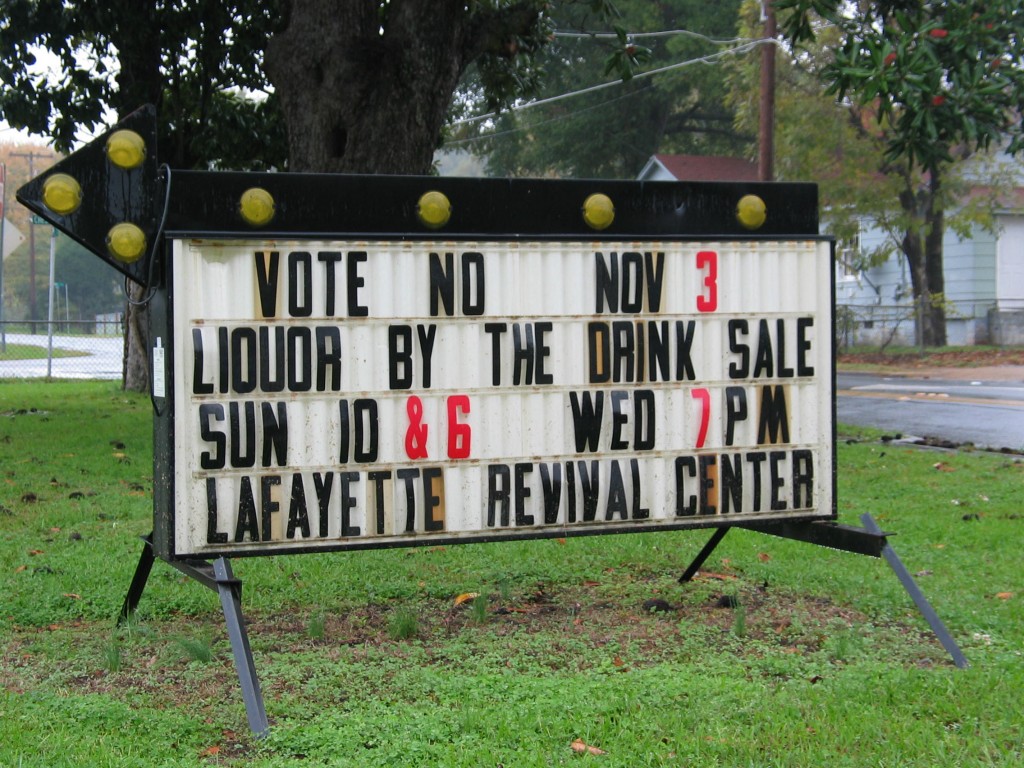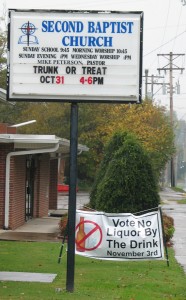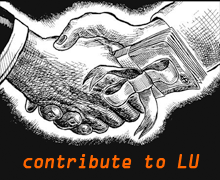11.02

The typical off-year election, a minor kludge of non-partisan, mostly uncontested, city and county positions, generates little to no political heat. But this year’s off-year vote has LaFayette voters worked up like never before because of a non-binding referendum to allow liquor by the drink.
The two sides of this issue, generally speaking, are residents who present it as an opportunity to restore the city to past glory, and churches and their members who oppose the referendum as a moral problem. But both sides are wrong about the issue in several ways.
THOSE IN FAVOR:
The pro-liquor argument is in essence a single point: with alcohol sales legalized, new sit-down restaurants will come into LaFayette. Those restaurants selling alcohol will deliver new tax revenues, new jobs, new residents for the city, and a new era of never-before-seen economic prosperity.
This is patently unrealistic.
Even with liquor by the drink made legal within the city, there’s not going to be a Logan’s Roadhouse on the downtown square or an Applebee’s in front of Walmart, because the city lacks the population, infrastructure, and industries so very present in Dalton, Ringgold, Fort Oglethorpe, and other communities cited as examples of what will happen with pouring legalized.
Without viable and ongoing manufacturing or information technology businesses in town, big restaurant chains will stay away. The city continues to lose major employers at a fast clip and the best anyone has been able to do for attracting new ones is scrape clean a 9-acre tract of land for a yet-unseen Volkswagen supplier and present the city as Yet Another Civil War Tourism Destination in a state full of the same. But neither of those solutions address the real problem that keeps industry away: no Interstate (something else possessed by Dalton and Ft. O.) and a severely unskilled workforce. Those issues keep out potential new industries/employers, and the lack of industries/employers will keep out big sit-down restaurant chains. (The lack of industries/employers and an associated increase in population also discourages restaurant chains that don’t sell alcohol from moving into town.)
Up against those obstacles, any change in the city’s liquor laws will result in, at best, two or three new locally owned sit-down restaurants and a couple of existing establishments that can start serving beer or wine along with meals.
One existing restaurant hoping to fall into that second category is Yan Yesica and Janiria. According to the 10/21 Walker County Messenger, Yan Yesica’s owner Miguel Santiago feels “his business has suffered from having to turn away patrons who want alcohol with their meal.”
Suffered compared to what? Yan-Yadi-Yadi opened last fall as the economy was really starting to fall apart, so he has no better economic times to reference, and I seriously doubt anyone who’s lived in LaFayette longer than a week has ever gone into his store expecting to buy alcohol. Mr. Santiago’s business would probably suffer less if the Napa Auto Parts-cum-mexican-restaurant location could consistently get a health inspection score higher than 80 (one recent check gave them a grade of 67). Not being able to sell alcohol is no excuse for not cleaning your restaurant, and Santiago should begin with that if he truly wants his year-old business to see its second birthday.
Any new restaurants that do eventually choose to come into town because of legalized pouring will have to fight battles against the most anti-business city codes department this side of California.
Several years ago planned development of a new Captain D’s in front of Walmart was squashed by the city council’s unreasonable demands. A tract of land between Favorite Market and Stansell’s Furniture was purchased, cleared, and prepared for building the restaurant, with plans submitted for approval. As has happened so many times before, those plans were dissected and picked apart by the city codes department, resulting in a laundry list of unreasonable demands for the site’s developer. Around this same time the council started publicly discussing still-unfinished plans to “limit” commercial signage down the highly commercialized stretch of Hwy. 27 in front of Walmart to keep the city from becoming too commercialized. The potential restaurant developer got the hint at that point and abandoned their plans. Two years later the lot still sits vacant, home not to a restaurant but to a faded for-sale sign.
One Captain D’s wouldn’t make much of a difference to the city’s employment or tax revenue situations, but this is only one story of a dozen or more recent cases. The Deli on the Square was shuttered for similar reasons after it went up for sale, and Choo Choo BBQ had to delay opening a new location for several months while its owners battled Rod Robertson and his crew of extortionist building code inspectors. Nameless others have failed to open or been forced to close by the same clumsy crew.
Those instances, and others, show how poorly the city’s officials treat outsiders and how far some in leadership will go to prevent certain people from opening a new business or buying an existing one within the LaFayette city limits. Until that changes, it doesn’t matter what liquor laws are on the books – LaFayette will continue to wither away economically.
The pro-liquor side has also argued that this referendum will result in decreased drunk-driving by giving those who choose to drink a shorter drive home. This is assuming that everyone who drinks in a restaurant consumes the full amount of alcohol all at once and then immediately climbs into their car; in reality most who imbibe with a meal will drink over a period of an hour or more, likely linger over their meal (care for dessert?) and be legally intoxicated by the time they get behind the wheel. And either way, drunk driving is drunk driving and illegal no matter how long or how far you go to get home.
Ultimately all these arguments from the pro-liquor side fall through as ludicrous, thus revealing their real motivation: being allowed to drink alcohol while eating in local restaurants because they would enjoy doing so. They could make a better case for that than they have for the publicly stated reasons – all of which, upon close examination, dissolve faster than the head on a glass of cheap draft beer.
THOSE OPPOSED:
Even if the reasons given by those who support liquor by the drink are false, they do at least get credit for attempting to give reasons for their position.
The churches, church leaders, and congregants most vocal against the referendum have posited little reason for their stance beyond just being against it; they have so far been able to produce no scriptural or legal reason why anyone should vote down the measure. The full extent of argument on this side is essentially “we oppose it because we’re supposed to” without much evidence or support given.
From the 10/21 Messenger:
“Todd Gaddis, pastor of First Baptist Church in LaFayette, openly opposes it. Gaddis and his church, as well as other church groups, have posted signs encouraging the public to “vote ‘no.’” Gaddis said he has seen too many suffer from alcohol and believes “there is no good that can come from it.””
“Phillip Williams, pastor of the LaFayette First Church of God, said he has “never found anything positive about the sale of alcohol for anything other than medicinal purposes.” “On vote day I will be casting my vote against it,” he said. Arguments for the sale of alcohol sound similar to the arguments used to legalize gambling in Mississippi, he said.”
Neither of these approaches makes for a convincing argument based on Biblical principles, just the personal experiences and opinions of two church leaders. Their arguments both lack a scriptural basis, because there’s nothing within the Bible that outright forbids the consumption of alcohol – only warnings against drinking to excess. They both know it, and Gaddis has said as much from the pulpit.
 Alcohol, like other resources God has provided, isn’t inherently good or bad. Like a gun, a hammer, or a car, the ultimate good or bad usage of it depends upon the user. The potential for abuse and addiction exist within the availability of alcohol just as they exist within the availability of prescription medication or fried chicken.
Alcohol, like other resources God has provided, isn’t inherently good or bad. Like a gun, a hammer, or a car, the ultimate good or bad usage of it depends upon the user. The potential for abuse and addiction exist within the availability of alcohol just as they exist within the availability of prescription medication or fried chicken.
Dr. Gaddis, to his credit, does say he feels legalized pouring wouldn’t add new business to the city – an opinion echoed here at The Underground. Rev. Williams makes a semi-coherent argument about lotteries and the educational system in Mississippi. The lack of clarity from both men may be as much the fault of the Messenger’s piss-poor editing as it is their own, but we’ve seen nothing any better coming from anyone in opposition to liquor by the drink, as exhibited in the 10/21 Messenger:
“Sandra Dalton of LaFayette is against bringing liquor by the drink into the city. “I don’t approve of it, because I have grandchildren and they have to go into these res-taurants and I don’t like them seeing people drinking,” Dalton said. “I just don’t like it. I am a Baptist and it is against my religion.” Dalton said she would not take her grandchildren to restaurants in Fort Oglethorpe where people are drinking. “I just don’t believe in it,” Dalton said.”
Ms. Dalton, like many other local church attendees, has adopted a “religion” based on rules and denominational teachings instead of relying on the guidance of the Holy Spirit and the direct teachings of Christ.
If the churches protesting liquor by the drink were following the teachings of Christ, they would be working together this closely on the things Christ actually commanded them to do (help the needy and tell others about Him) instead of wasting a semi-coordinated effort on a political non-issue. Some area churches do work independently to serve the community and reach out to people, but none of them work together very well (or very long) to accomplish those goals.
The eventual and almost-assured approval of liquor by the drink will only serve as a new target for the local churches and their leadership to rally against; but that’s a red herring, a distraction, from the responsibility those churches bear for their own lack of action in addressing the core causes of addition and cyclical spiritual poverty. The fight against liquor by the drink is a quixotic campaign that only takes attention away from the spiritual battles churches should be fighting within the community’s poor, disabled, and spiritually lost.
THOSE SCARED:
The one group that should, by rights, take a leadership role on this issue is the LaFayette city council. But they’ve managed to keep back in the shadows, scared to even voice a personal opinion for or against the alcohol measure.
As with everything else, the council (and mayor) are going to sit the fence and not make a decision that might offend the powerful churches and community leaders, even though most of the council’s current members apparently want the measure to pass.
The feedback from their decision last year to allow beer sales at the new $2.5 million golf clubhouse has discouraged any future independent thought on this issue even though they desperately want it to pass. The pouring measure is a non-binding straw poll the council never had to even put on the ballot, but they need “the will of the people” to shield them from the wrath of church groups and others who would vote them out of office for letting alcohol into town.
Without any other workable or coherent plans to fix the city’s multitude of problems, the council and many other residents have pinned their hopes and dreams on pouring – but all it does, ultimately, is distract from the city’s real political problem: the council itself.
CONCLUSION:
Ultimately, voting on liquor by the drink itself doesn’t matter. The issue is a distraction from two bigger problems that have held the city back for years: inactive, uncooperative churches who aren’t doing what they should or going where they should to combat the root causes of alcohol addition; and an ineffective, indecisive city council and mayor that have run out of ideas and should be run out of their jobs.
The second of these issues can be addressed, in part, by Tuesday’s city election. The first issue is a bit more involved and requires much prayer and changed hearts/minds from the thousands of locals who occupy church pews each week. Neither issue will be made better or worse by allowing liquor sales within the city of LaFayette.











Keep posting stuff like this i really like it.
Thanks, we’re trying. Be sure to tell others about the site! Share links on MySpace or Facebook and e-mail these articles to your friends and family members.
-// The LaFayette Underground //-